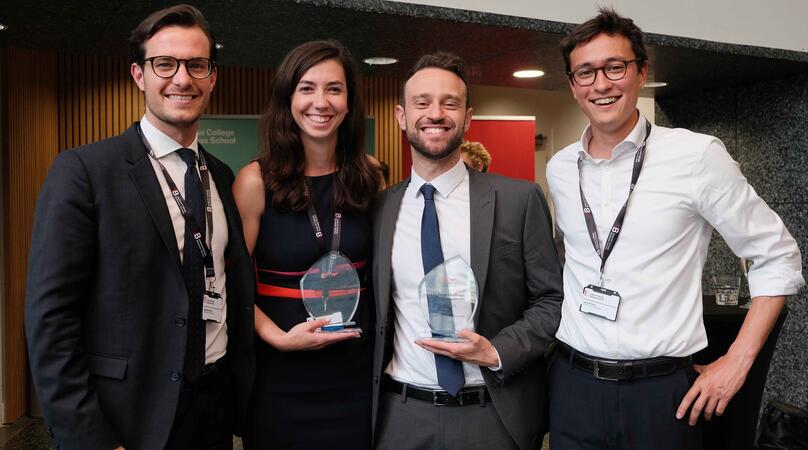
MSc Financial Technology
12 months
£51,000
London, UK
Study your MSc Financial Technology in London at a global top 10 university
Equip yourself with in-demand quantitative and analytical skills for a successful career in FinTech
FinTech is a rapidly evolving field that has transformed banking and is predicted to have a growing impact on the economy. Our MSc Financial Technology programme prepares you for a career in FinTech in the financial services sector. It equips you with in-demand quantitative and analytical skills, knowledge of the sector, and practical experience. Previous MSc Financial Technology students have found jobs in major companies such as Barclays, Credit Suisse, Morgan Stanley, HSBC, Goldman Sachs, JP Morgan, and others.
The programme will enable you to understand, execute and possibly develop disruptive financial innovations using appropriate tools and techniques. You will be able to demonstrate your skills in analysing large data sets while developing a key understanding of FinTech topics. A range of programming tools will facilitate live implementations of financial models, helping you to analyse and evaluate investment options and data.
Are you ready to join the FinTech revolution?

Sought-after graduates
Our MSc Financial Technology will set you up for success. With 92% of our graduates employed within six months (MSc Financial Technology 2024), and connections with leading employers, you’ll have the skills to stand out in a competitive job market.

Your global Imperial network
Our Finance suite has over 7,000 alumni which, alongside the 260,000-strong Imperial alumni network and industry connections, means you have access to a world-leading global network from the day you start your programme.

Tailored learning
We harness individuality as this makes for diverse and employable candidates. Our MSc Financial Technology offers a wide range of elective modules in in-demand subject areas to help tailor your learning to your career aspirations.

London location
Study in a global hub for business and finance, learn across our South Kensington and White City campuses, and benefit from our relationships with major employers, offering valuable industry connections and helping you build a global perspective.

Your tech advantage
Imperial is a world-leader in STEM education, with a rich culture of entrepreneurship and innovation. You can take advantage of our technology-related programmes, research opportunities, state-of-the-art facilities, and world-class research centres.
Programme content
Our MSc Financial Technology is a one year, full-time intensive programme with classes running Monday to Friday between 08.30 and 21.00. You should expect to attend one evening class per week in addition to other optional activities such as guest lectures or alumni and careers events which may be scheduled in the evening.
This programme brings together highly relevant modules and electives to provide you with key quantitative and analytical skills and strong understanding of the financial sector. Tailor your learning to meet your career aspirations.
We are pleased to offer an optional extended term, that will allow you to extend your programme duration to 16 months. This will give you the opportunity to commit to a longer Work Placement, gaining deeper work experience, global experience and earning additional credits. Please note, the extended term is subject to an additional tuition fee.
Please note, programme content is subject to change. Candidates that fail to successfully complete this degree are not entitled to a Postgraduate Certificate or Postgraduate Diploma.
Online pre-study modules
Before the start of your programme, you will be expected to complete online pre-study modules, delivered via Canvas, a virtual learning environment (VLE). These include an Accounting Primer module, an online Finance Careers Primer and the Career & Professional Development module. These modules do not, however, contribute to the calculation of the final award.
Induction
Your MSc Financial Technology induction will be spent at our vibrant South Kensington campus in London. You will be invited to a welcome event where you can meet and network with your fellow students, distinguished faculty and dedicated programme staff, forging new connections and getting a taste of life at Imperial.
Foundations in Financial Technology: Business Valuation
Business Valuation provides understanding of corporate finance, financial intermediation, and investment decision rules. It focuses on valuation techniques for securities, especially common shares, through theory and case examples. Alternative approaches link firm value to book value or current earnings, supporting specialised finance study.
Applications of R and Databases for Finance
Application of R for Finance provides foundations of programming with variables, arrays, conditional statements, loops, and functions. Focus on modelling in financial markets, including regression, volatility modelling, and asset pricing.
Markets and Securities
Markets and Securities firstly provides a broad overview of key financial markets; Stocks, Bonds and Derivatives. Secondly it introduces the concepts of risk and return and how diversification influences risk and return.
Data Structures and Algorithms with Python
This module introduces algorithm design, data structures, and computational problem solving with applications in modern technological innovation. You will study paradigms of algorithm design, computational complexity, and core methods such as search, sorting, and shortest paths. The module also provides an introduction to Python, focusing on programming constructs, debugging, and good programming practices
Accounting and Corporate Finance
Corporate finance is at the heart of investment banking and crucial to running a successful business in any sector. In this module you cover all the key elements of company finance, valuation and risk management. You will learn to understand how to assess individual investment projects, value companies, and evaluate the sources of finance available to companies.
Big Data in Finance
Over the past few years, there has been an explosion of interest in the use of large datasets and new empirical techniques to make financial decisions of all kinds. In this elective we examine how the combination of large datasets, empirical techniques including machine learning, and insights from behavioural finance are helping in making more efficient financial decisions. Two areas in which progress has been especially rapid are credit analytics (predicting default in personal loans, mortgages, and firms), and asset management. This elective focuses on these specific markets, considering them from supply, demand, and regulatory perspectives. You will build empirical models to illustrate important concepts throughout the elective.
Blockchain and Applications
This module will aim to empower you with an understanding of blockchain/distributed ledger technology from first principles, opportunities and challenges the innovation presents. At the end of the module you will be equipped with the skills necessary to use blockchain technology to optimise existing processes, innovate business models and create new markets.
Ethics & Professional Standards in Finance (online)
This module will to introduce you to corporate responsibility and professional standards for financial analysts. You will be taken through a review of the key factors and responsibilities for ethical practice in finance. There are eight sections in total for students to complete. Each section will include video commentary, a web-based lecture, suggested readings, practical examples and discussion questions to test the key concepts learned in that section.
Financial Econometrics
The module introduces you to econometric methods for analysing data in finance, economics and related disciplines.
You will learn how to conduct, and how to critique, empirical studies in finance, economics and related fields. Moreover, you will learn how to distinguish between correlation and causation and subsequently evaluate the importance of causal empirical models.
Investments and Portfolio Management
This module provides you with a critical understanding of techniques used for investments and portfolio management. The teaching is accompanied by case studies and realistic practical examples that you will solve each week using programming software such as R. By the end of the module you will be able to implement trading strategies and portfolio construction methods in a wide range of assets.
Mathematics for Finance
The aim of this module is to introduce students to the theory of asset pricing and relevant mathematical tools. Throughout this module you will learn to demonstrate comprehensive knowledge of the fundamental concepts in asset pricing, such as state prices, arbitrage, payoff replication, and risk-neutral pricing. Furthermore, you will learn to evaluate the key concepts in individual decision-making and market equilibrium, as they relate and give rise to asset prices.
Key electives
Asset Allocation & Investment Strategies
Computational Finance with C++
Derivatives
Entrepreneurial Finance and Venture Capital
Text Mining for Economics and Finance
Global elective: Global Markets and Policy for Practitioners
Other electives
Advanced Corporate Finance
Advanced Options Theory
Applied Trading Strategies
Applied Quantitative Macro Strategies
Climate Finance
Fixed Income Securities
Insurance
International Finance
Machine Learning and Finance
Market Microstructure: Trading and Liquidity
Real Estate Investment, Finance and Private Equity
Shareholder Activism & Corporate Responsibility
Structured Credit and Equity Products
Sustainable Finance and Investment
Systematic Trading Strategies with Machine Learning Algorithms
Applied project
Most students choose to undertake an Applied Project because it has a practical focus and is designed for those who are interested in a career in a financial institution. If you choose this option, you will also complete an additional elective. The report, of 3,000 words, is due for submission in August.
Work placement (summer)
If you have secured a work placement, you will be able to link your project to the area of finance of the employer organisation. The Programme Director is required to approve the work placement in advance.
Research project
Advised by a faculty supervisor, you’ll identify a topic or issue of interest and then analyse it statistically or numerically. The Research Project is ideal if you wish to follow an academic career and apply to a PhD programme. Your project report, of up to 10,000 words, is due for submission by mid-August.
Extended Work Placement
With the Extended Work Placement you will access additional work placement opportunities, including longer summer internships in the UK and worldwide. You will gain deeper work experience credentials and boost your marketability with potential future employers. The Extended Work Placement contributes to the development of your managerial potential by applying problem solving techniques to a challenging business situation in which you are fully immersed. The focus is on developing your skills in managing real business tasks, drawing on the knowledge and skills achieved in other modules of the programme. Read more about the extended term here.
Global Markets and Policy for Practitioners
This new module will give students the opportunity to travel to Dubai and is designed for individuals interested in careers in finance, investment management, or policy institutions. It provides tools to understand how global economic developments and policy actions influence financial markets and asset allocation. The module blends conceptual frameworks with practical examples drawn from recent macro-financial events. Through this module, you will develop the ability to interpret global trends and assess their implications for markets.
Practical Finance & Data Skills Workshops
Hands-on training that turns theory into action - master the tools, data, and real-world skills to make smart confident financial decisions. This includes:
- Optiver & Imperial Trading Academy
- Amplify Trading Workshop
- Introduction to Bloomberg
- Excel Modelling
- Introduction to Python
- C++
- Visual Basic Applications
Future-Ready Skills Development
Stay ahead of the curve with in-demand skills that power tomorrow's careers - from communication and teamwork to strategic networking. This includes:
- Personal Branding
- Imposter Syndrome
- Presentation Skills
- Academic and Professional Writing Skills
- Working Effectively in Teams
- Communicate with Impact! A Masterclass for Ambitious Professionals in Financial Services
- Alumni Connections in Finance
- Values Day: Core skills for inclusive leadership
Please note that the availability of certain elective modules may be subject to specific prerequisites. This means that, in order to enrol in these modules, students may first need to have completed particular courses. These prerequisites are in place to ensure that students are well-prepared and able to engage successfully with the module content.
Elective offerings are reviewed annually to reflect student demand, industry preferences, and changing market needs and trends. As a result, the range of electives available may vary from year to year.
Although we cannot guarantee a place on a specific elective if demand is high, there is a wide range of electives available to choose from.
While all electives are subject to change and may, on occasion, be modified, replaced, or withdrawn at the University’s discretion, such adjustments are expected to be infrequent.

Meet our MSc Financial Technology student Renee Djatmiko
Admissions
Applications for 2026 entry are open.
Discover our admissions process for the MSc Financial Technology including entry requirements, how to apply and key dates and deadlines.
This programme is highly competitive, so early application is advised; this will put you in a stronger position to be considered for a scholarship, and provide access to exclusive admitted students events.

Fees and funding
Choosing to pursue a Master's is one of the most important decisions you will make and is a substantial investment in yourself.
Many of our students fund their studies through multiple funding sources. We offer a wide range of awards, including a number of full scholarships to the most talented applicants. We’ve also provided information about the different financing options available to you.
What our students say

“The programme modules themselves are an integral part of staying up to date with recent developments. Most of the faculty at the Business School also work in industry, which makes it especially interesting to discuss current pressing issues and trends with them. ”
Class of 2026
Meet the class
Women in Finance | Investing For A Sustainable Future
26 February 2026
18.30 - 21.30
Royal Geographical Society, London
Join us for an insightful evening exploring the journeys of accomplished women who have navigated the dynamic finance sector, and discover how our MSc Financial Technology could open up similar opportunities for you.
Next steps
Career impact
At Imperial Business School, your career is our priority. Our dedicated Careers team is committed to helping you achieve your personal and professional goals. With close links to industry and a busy calendar of events, workshops and personal development programmes, you will be prepared for career opportunities in highly competitive fintech companies. Our MSc Financial Technology students have secured positions in the finance and consulting sectors. They have been hired by renowned companies such as Barclays, Bloomberg, Citi and KPMG.
Employment outcomes below refer to the class of 2024.
employed within six months
employed in the UK

“I secured the offer prior to the Master’s, but my company really appreciated I was going to do MSc Financial Technology. In fact, the FinTech team in J.P Morgan reached out to me when they saw that I was going to do the Master’s to offer more information on the team in the case I later want to join.”
Meet your faculty
Our finance faculty are specialists in the field. They have international research reputations, consult for global corporations, advise government and international agencies, sit on the boards of mature companies as well as new ventures, and are frequently asked by the media for academic insight on a wide variety of topics.

Lara Cathcart


Enrico Biffis



Start your journey today
Frequently asked questions
All applications to our postgraduate programmes are made online – we do not accept paper applications. Please refer to the ‘How to apply’ section of each programme page. This details which documents you are required to submit with your application and the selection process.
All of our programmes are academically rigorous and include a quantitative component. Therefore, all candidates are expected to have a basic level of mathematics before the start of the programme. The quantitative experience statement provides an opportunity to demonstrate this to the selection committee.
In the quantitative experience statement, you need to list up to five of the most quantitative modules or elements of your studies to date. You should detail:
- The main topics of study (eg: algebra, probability etc)
- The level of study (eg: high school, undergraduate degree, short course etc)
This will allow the selection committee to have an understanding of your quantitative experience to date.
Quantitative experience is a key selection criterion for our more quantitative programmes. There are: MSc Finance, MSc Finance & Accounting, MSc Financial Technology, MSc Investment & Wealth Management, MSc Risk Management & Financial Engineering, MSc Business Analytics & AI, MSc Climate Change, Management & Finance and MSc Economics & Strategy for Business.
Please check the entry requirements for your programme of interest to ensure your background is sufficiently quantitative. For other programmes, candidates are advised to review the programme content and the pre-study modules. You should check what the numerical content of the programme includes before submitting an application.
Yes, you can. Our finance programmes at Imperial Business School are highly rigorous, and our students are required to have a high level of quantitative skills. If you are considering applying for a programme within our finance Master’s portfolio, we advise you to take our online maths test to test your quantitative ability and determine if you are suitable to apply for the programme.
Please note, this maths test is most relevant to candidates considering the MSc Finance, MSc Investment & Wealth Management, MSc Financial Technology and MSc Risk Management & Financial Engineering programmes.
You can apply to be considered for one programme each year. We will take your areas of interest and eligibility into account when considering you for alternative programmes.
It is not compulsory to submit the results of an approved English language test with your application. However, it is strongly encouraged. It will add weight to your application if you are able to show that you have met the language requirement prior to applying.
Read about detailed information regarding the Business School’s language requirements and the tests that we accept
To submit a verification request, you must first create an online account with Qualification Check. You should use the unique link provided to you as part of your offer conditions.
Once you have completed the two-step registration process, you will have access to your online account. Search for the name of the institution at which you obtained your qualification(s).
Then, follow the steps to enter the required information for submission of a verification request. Your details will then be sent to that institution to be authenticated by the appropriate department. Find more information at Qualification Check.
Qualification Check’s standard procedure is to contact the primary source of the information. This is the institution at which you studied. Qualification Check will regularly contact the relevant department at the institution to confirm the authenticity of your qualifications.
We understand that applications are urgent and Qualification Check makes every effort to accommodate your needs and expedite processes. Some institutions may take longer than others. But rest assured that Qualification Check is working hard to complete your verification. Find more information at Qualification Check.
As part of your application, you will be asked to provide the contact details of two referees. Your referees will be contacted by email once you have completed and submitted your application. The email will contain instructions on how they can submit your reference via our application system.
Please ensure that each reference letter that is submitted has been sent from an academic or professional email address. We cannot accept references sent from personal email addresses, such as Gmail, Hotmail, 126, 163, Sina, QQ, and Yahoo.
Our electronic application service is provided by an external provider. Therefore, there may be a delay before the receipt of your references is confirmed on your student application account.
If you receive confirmation that your references have been received but this still isn’t confirmed on your account a week after receiving the confirmation, please contact the Central Admissions team at business.admissions@imperial.ac.uk.
If you submit a complete application by the deadline, you will receive an outcome by the corresponding decision deadline. However, we may be unable to guarantee a decision by the deadline if:
- There are delays in receiving your references
- The documentation required to progress your application is missing
If the requested information is not received within five working days, we may be unable to guarantee a decision by the round deadline.
If you have received confirmation that your references have been submitted but this is not reflected in your account after a week, please contact the Central Admissions team at business.admissions@imperial.ac.uk.
Yes. As part of the selection process, shortlisted candidates for our MSc programmes will be invited to complete an interview. Interviews are conducted through our video interview platform. You can access it online to record and submit your answers.
The interview process typically takes about 20 minutes and does not require extensive preparation. It aims to supplement your written application and help you convey your suitability for your chosen Master’s. This will be done through answering questions about your previous experience and future aspirations.
AI/Chat GPT guidance:
The purpose of the interview is to get to know more about you. We want to see how you approach problems, your motivations and wider interests.
If we identify malpractice or answers provided are not genuine, then this may factor negatively into the admissions committee decision.
For all MSc programmes, you can normally expect to receive a decision within six to eight weeks of submitting a complete application. Please keep in mind that during busy times and/or where documents are missing from an application, this time may increase.
When an offer is submitted by the Business School, the Central Admissions team needs to make a number of final checks before it can be formally approved. These may include:
- An additional review of an applicant’s academic background
- Ensuring the references we have received are valid
Until you have received confirmation of the official offer via Imperial’s applicant portal, please do not:
- Arrange accommodation
- Book flights
- Decline any other offers you may be holding
The majority of offers are successfully approved by Central Admissions. You will be able to see full details of your offer conditions once your official offer has been confirmed.
Unfortunately, we are unable to confirm when you will receive a decision on your application. We will be in touch via email as soon as there is an update. You do not need to provide any additional information unless you think it will add significant weight to your application. For example, updated transcripts, relevant internships, English language results.
Please email your programme Recruitment & Admissions team if you would like feedback on your application. Please note that whilst limited feedback can be provided, the decision of the academic selectors is final. It will not be possible for your application to be reconsidered.
If you receive an offer you can request to defer it to the following year. Requests will be considered until 15th June.
Requests submitted after 15th June 2026 will only be approved in exceptional circumstances.
If you already paid your deposit for the current admissions cycle, this will be carried over to your new offer. However, our tuition fees do increase each year and you will be required to make up the difference between the old deposit and the new deposit amount.
Please note that you can only defer once.
We are unable to assess eligibility before an applicant applies. The academic selection committee needs to review a full application before any decision can be made.
Please check the specific entry requirements of the programme you are interested in studying. Please also check our international entry requirements. If you feel you meet our entry requirements you can apply online.
In addition to the guidance on our website, we hold regular information sessions online and on campus throughout the year. Here, we would be happy to discuss your suitability in more detail.
We accept a wide range of international qualifications for postgraduate study at Imperial.
We've provided general guidance in the country and region index. Here, understand how qualifications awarded by public institutions overseas may satisfy our minimum academic admission requirements.
We review our requirements annually. Updates usually happen in September each year before the next academic year of entry.
If your country or region is not listed, please contact the relevant Admissions team for further information.
Most MSc programmes require at least an Upper Second Class Honours degree (or international equivalent) to be admitted. Work experience can add weight to an application. However, this would not replace the academic requirement, no matter how extensive the experience is. The exceptions to this are:
Please refer to the programme’s entry requirements for more detailed information.
The Business School does not offer pre-sessional English courses. We do not accept attendance of a pre-sessional English course as a means of meeting the English language requirement.
Tuition fee amounts are different depending on the programme you are studying. For more specific information on fees and deposit amount, please visit the Fees and funding page for your programme of interest. Unless otherwise stated, tuition fees are the same for UK, EU and international students.
Yes, you can. You can pay your tuition fees in either one or two instalments. These are payable at the start of term, or at the start of term and February, respectively. If you pay in instalments there will be a 2% surcharge of the total amount added to your first instalment.
You would be asked to select a payment schedule during the offer acceptance process. Please contact the Student Finance Team if you have further questions about this process.
The Business School offers a variety of different scholarships, each with unique eligibility criteria.
All candidates who submit an MSc application before the scholarship deadlines (listed on our website) and receive an offer for one of our programmes will automatically be considered for scholarship(s) relevant to their programme, providing they do not have additional criteria such as a video submission. You can be considered for multiple scholarships at the same time.
Additionally, there are a number of cross-programme awards and programme specific awards also available. Please check on the scholarships page on your programme of choice for eligibility and entry requirements.
Find out more information about MSc Financial Technology scholarships.
Yes, we offer a 10% bursary on programme fees to successful candidates with either:
- An undergraduate degree from Imperial awarded at a minimum of upper second class
- A Master’s degree awarded with a minimum of Merit
To be considered for this bursary, you must submit your application by the scholarship deadline.
If an organisation is responsible for paying your tuition fees, you must provide valid proof of the sponsorship.
Satisfactory evidence of sponsorship is usually regarded as an original, dated and duly authorised letter from your sponsor on headed paper, including:
- Your name and College Identifier Number
- The programme for which you have been offered a place
- The amount of fees which will be paid by your sponsor (please report in GBP)
- The address to which the invoice should be sent
- Any Purchase Order Number required
- Confirmation that the fees will be sent directly to Imperial College
Sponsorship letters should be emailed to the Central Admissions team at business.admissions@imperial.ac.uk
Your CAS number holds information about the programme you will study and if you have paid any fees. You will not need a formal letter from Imperial confirming your offer status for your visa appointment.
For more information about what you will need, see the UKVI website.
If you need any advice about your visa please contact the International Student Support team. Most information can be found on the International Student Support website.
We will start to issue CAS numbers from April. The details of your CAS will appear on your My Imperial record after you have met all the conditions of your offer. Please note that you will need to upload a scanned copy of the photo page of your passport and current visa (if you have recently completed a degree in the UK), before your CAS can be issued. Please upload these documents to the ‘Passport/visa’ section of your My Imperial account.
Once your CAS is ready, you will receive an email confirming that it has been uploaded onto your My Imperial account. If you log into My Imperial you will be able to find your CAS number and the details that have been included in your CAS.
Please note that we cannot provide you with a CAS if you have outstanding conditions on your offer. Please ensure that you allow enough time to meet your conditions and apply for a visa before the start date of your programme of study.
The Business School holds online information sessions throughout the year to give you the opportunity to learn more about the programmes from the Programme Director, current students and alumni. Please refer to the meet us page to find out when the next event is being held for your interested programme(s).
The Business School is located on the South Kensington campus of Imperial London. Please refer to the location page for our address and guidance on how to get here.
Many students choose to live in private rented accommodation whilst attending the Business School whilst others choose to book accommodation through GradPad. Please refer to the accommodation page for more information regarding the different types of accommodation available to you.
Please note that before you contact us you should also check information on the relevant pages on the Business School or College website. If your question isn’t answered, please contact the appropriate team below.
General application queries
Recruitment & Admissions team
business.school@imperial.ac.uk
Deposit and tuition fee invoice queries (including refunds)
To check if your payment has been received
Tuition Fees Team
tuition.fees@imperial.ac.uk
+44 (0) 20 7594 8011
To check if your documents have been received
Queries regarding your CAS number
Central Admissions
business.admissions@imperial.ac.uk
+44 (0) 20 7594 7258
Career-related queries from admitted students
Careers Team
icbs.careers@imperial.ac.uk
+44 (0) 20 7594 9617
Visa and immigration queries
International Student Support
+44 (0) 20 7594 8040
Accommodation queries
accommodation@imperial.ac.uk
+44 (0) 20 7594 9444
General student information and advice
Student Hub
student.hub@imperial.ac.uk
+44 (0) 20 7594 9444
Advice on budgeting and London living costs
Advice on external scholarships
Student Financial Support
student.funding@imperial.ac.uk
+44 (0) 20 7594 9014
If you’ve submitted your application but haven’t received your CID number
Registry Systems
registry.systems@imperial.ac.uk
Password or technical issues with your Imperial Gateway account
IT Service
deskservice.desk@imperial.ac.uk
+44 (0)20 7594 9000
Almost all of the MSc programmes we have available are 12 month, full-time programmes. The only exception is our MSc Strategic Marketing (online, part-time) programme, which is available on a part-time basis.
Yes, we offer an Economics, Finance and Data Science Bachelor's degree, as well as a range of courses at undergraduate level:
- BSc Economics, Finance and Data Science
- BPES Programme
- Joint Honours and Intercalated BSc Programme
- Summer School Programme

Empowering lessons from Imperial’s Women in Finance panel discussion
Discover key insights from Imperial’s Women in Finance panel discussion, where industry leaders shared career advice, mentorship lessons and strategies for success in finance. Read more for inspiration and networking takeaways.

Imperial’s Extended term: enhanced flexibility for your programme
Enhance your Master’s or Full-Time MBA experience with our 16-month Extended term. Gain valuable real-world experience through an extended Work Placement or Global Exchange, strengthening your career credentials and expanding your professional network.

Meet the Finance Masters' class of 2024-25
We're excited to welcome another outstanding cohort of Finance Master’s students to Imperial Business School. We’ll introduce you to these talented individuals, sharing their diverse backgrounds.